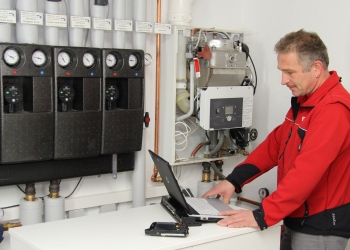The steely edge of boiler replacement

Modern boilers are about as efficient as they can be, putting reliability and long-term operating efficiency at the top of the agenda. Peter Gammon of Elco UK shares his experience.
The building-services industry is continually reminded that many of the commercial premises in use today will still be around in 2050 and that if the emissions from our existing stock are not improved, EU energy-reduction targets will not be met.
Of course, there are various measures that can be considered for a low-carbon retrofit, but one of the most common scenarios faced by building-services engineers is the need to replace ageing boiler plant. High-efficiency condensing units are in abundance these days, but beneath the surface there are some key differences which can have a significant impact on a boiler’s long term performance.
So, what are the key features to look out for?
Excellent efficiencies might sound like the obvious answer, but, as most manufacturers will agree, the days of gaining an advantage with a percentage here or there is a thing of the past.
 |
| The harsh operating environment in a condensing boiler makes stainless steel the preferred material for heat exchangers. |
Modern gas-fired condensing boilers are already at the maximum level of achievable efficiencies. Subsequently, rather than looking at headline figures before the unit is installed, a refocus to lifetime efficiency should be considered, as this is where the material a heat exchanger is manufactured from starts to have a bearing.
In a condensing boiler, the heat exchanger operates in a very harsh environment and has to tolerate extreme thermal and mechanical stresses, the vagaries of system water quality and dissolved oxygen — not to mention the effects of corrosive condensate. Therefore, using a material specifically designed to withstand such an onslaught is vital; for this reason, stainless-steel water tube type heat exchangers have become the preferred option for gas-fired condensing boilers.
At Elco UK, we have used such heat exchangers for years to ensure reliable operation; many of the latest designs also promoting turbulent flow within the waterways, helping to eliminate the static boundary layer and, in turn, reduce the tendency for micro-boiling. Having such features diminishes the risk of internal fouling, while also facilitating efficient heat exchange and quieter running. The grade of stainless steel used in a heat exchanger must also have a very high resistance to corrosion — not only internally, but also externally — to retain the integrity of the component throughout its operating life.
There is no doubt that replacing boiler plant in a commercial building is often a carefully considered and, inevitably, significant investment. So, after specifying the correct unit, the second key element to maintaining system efficiency is the implementation of the correct commissioning schedule.
Unfortunately, the whole concept of commissioning has become somewhat under-utilised within the industry. It should be far more of an in-depth process, rather than a one-off activity that only occurs when a new building is completed or an existing one refurbished. Good commissioning should take a more holistic view over many years, taking into account how a building will be used and occupied to optimise peak performance. Commissioning also provides an opportunity to set up a building correctly, using appropriately skilled engineers and technicians who can put the heating system through its paces without affecting the occupiers.
The procedures established in the commissioning process should even consider the ongoing maintenance regime. Integrating a regular inspection and servicing schedule is vital to safeguarding a system against possible poor performance. So, it is important that building and facilities managers are well-informed on the techniques and disciplines of keeping their heating appliances in peak working condition.
 |
| A regular inspection and servicing schedule is vital to safeguarding a system against possible poor performance. |
Manufacturers can, of course, offer plenty of advice and assistance, but only by ensuring commercial boilers are maintained and serviced properly can heating systems run efficiently and economically for their entire lifecycle.
Given the scale of the carbon-emission targets facing the commercial buildings sector these days, making certain the heating and hot-water plant is at peak efficiency is a significant consideration. As gas-fired condensing boilers remain a key part of any retrofit project, ensuring the installation remains highly efficient for its lifetime is the new priority.
Installing units with stainless-steel heat exchangers can act as a silent insurance policy for both the boiler plant (and specifier) — allowing it to operate with the peace of mind that it should last for its designed operating life. Combined with a well-staged service and maintenance schedule, boilers can continue to operate at the levels they were originally designed for, and help the existing stock of commercial premises stay energy efficient for years to come.
Peter Gammon is technical manager at ELCO UK (formerly MHS Boilers).







